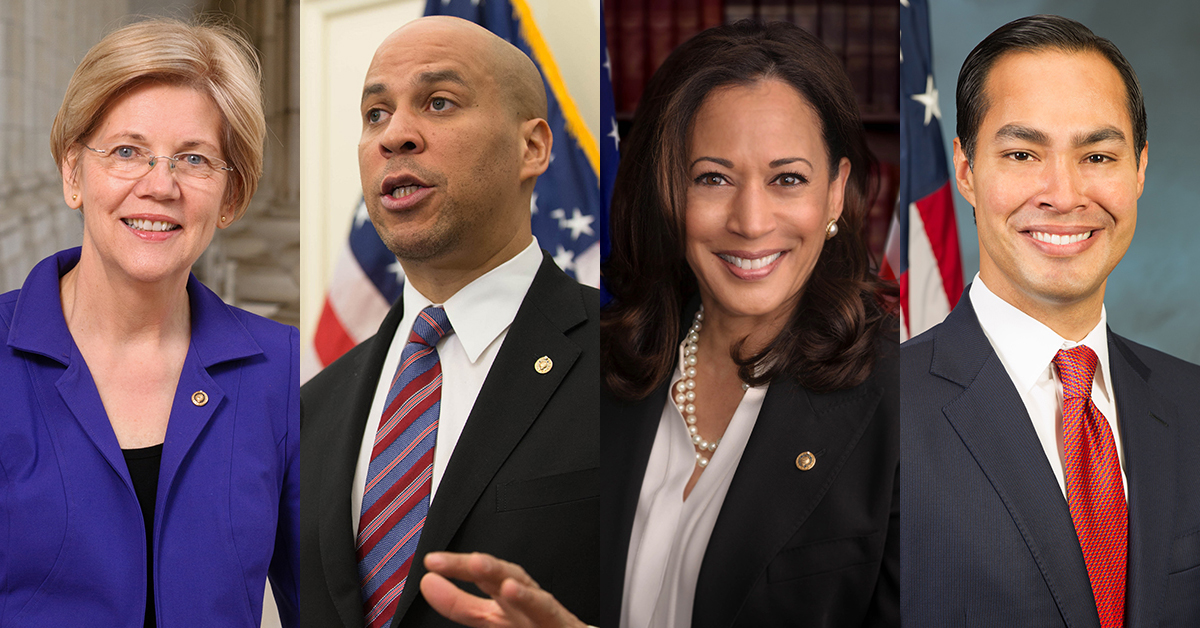The Democratic presidential candidate field is very crowed and, so far, includes Senators Kamala Harris, Cory Booker, Bernie Sanders, Kirsten Gillibrand and Amy Klobuchar. Governors Jay Inslee, former Congressman John Delaney, Congresswoman Tulsi Gabbard and a few mayors, including South Bend, Indiana Mayor Pete Buttigieg and former San Antonio Mayor Julian Castro. Former elected official Beto O'Rourke is running and former Vice President Joe Biden is allegedly considering. It seems like a new presidential candidate is announced every three days and it doesn't seem like it will slow down. The latest, by my count, is Governor John Hickenlooper of Colorado.
Despite their numbers and diversity, none of these candidates are focusing on the political reality that more and more voters are rejecting party labels. 2020 will see a fiercely competitive primary election season, yet tens of millions of independent voters will be disenfranchised. The Democratic Party has a golden opportunity to bring independents — now the largest group of voters in the country — into the conversation and into their vision for the future, but they are squandering it.
In the 2016 presidential primaries, over 26 million independent voters were locked out of voting. Young voters and young voters of color have the highest rates of political independence and are heavily disenfranchised by closed party primaries. It is estimated that at least 1 million African American independents were shut out of voting in the 2016 presidential primaries. Nationally, 30 percent of African Americans voters, 41 percent of hispanic American voters and over 50 percent of millennials self-identify as independents. But will the political process reflect the American people or the parties?
The 2020 democratic primary calendar starts with Iowa and New Hampshire. But changes in the calendar have moved states with large populations of people of color, for example California and South Carolina, earlier in presidential primary season. Many states with closed presidential primaries such as New York, Pennsylvania, Florida, Michigan, New Mexico and Arizona deny independent voters, including the large numbers of African American, Hispanic American, Native American and Asian American independents, the right to vote in presidential primary elections.
Equal voting rights in all elections including primary elections are critical for the full enfranchisement of communities of color. Independents are those voters who defy the partisan divide. Many Americans want to break out of the two party stranglehold in which issues such as quality education and housing, that are so fundamental to human life and health, are cut down to a liberal vs. conservative, Democrat vs. Republican frame work and stripped of their depth and relationship to ordinary people.
Too often, Democratic Party elected officials come to communities abandoned to isolation and poverty admonishing residents that they have to defeat the Republicans or else they will lose what pittance single-minded loyalty to the Democratic Party has allowed them to have. Not surprisingly, Black people young and old are revolting from this setup. Witness the 1.6 million African American voters who stayed home during the 2016 election.
Democratic Party leaders will say they have to maintain party control in order to defeat Donald Trump, but it is party control and closed party primaries that are driving independent voters to swing so wildly between the parties in general elections. These Democratic leaders seem blind to the fact that it would be expansive, and to their advantage, to open their primaries to independent voters and message them early. After all, independents are the voters who have been determining the outcome of national elections for years and just gave control of the House to Democrats in the 2018 midterms.
California 's top two open primary system, which allows all voters to vote and the top two vote getters, regardless of party, go on to the general election ballot, has resulted in the election of more people of color in the state. And a recently released study of this top two election system authored by Charles Munger, Jr. and the University of Southern California Schwarzenegger Institute found that it increased electoral competition and resulted in greater interest in elections.
It was 54 years ago this month that Dr. King led the Selma march for voting rights. In that same spirit of democracy and inclusion, independents are calling for equal voting rights for all Americans. I ask, will any of the Democratic presidential candidates have the courage to follow the leadership of these American voters?
Dr. Jessie Fields is on the board of Open Primaries, a national election-reform group. She is also a founding member and activist with the New York City Independence Clubs and a Harlem-based primary care physician.
